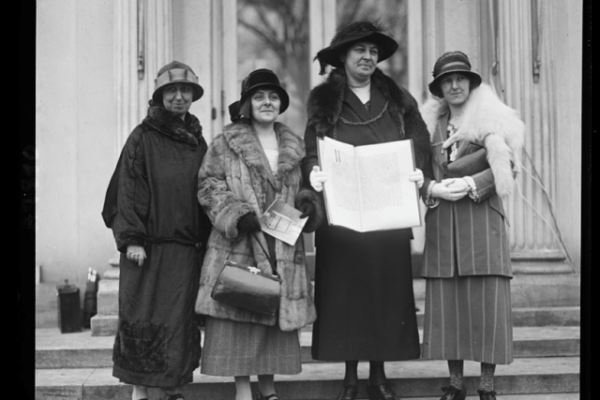Marking International Women’s Day, 2022
‘Peace profiles’ is a series by Academi Heddwch Cymru, which aims to draw attention to peace figures from around the world who have had a role in Welsh peace history. This feature marking #IWD2022, celebrates 100 years of Welsh Women in world peace and diplomacy, with a focus on Britain’s first female delegate to Geneva.
Archive Images (within Tweets threads) courtesy of Glamorgan Archives
2022 marks the centenary of the Welsh League of Nations Union (WLNU), established out of the ashes of World War One to press for peace through cooperation and diplomacy – with women at the forefront of campaigning. In September 1922, Neath resident Winifred Coombe Tennant became the first woman to represent the United Kingdom as a delegate to an international organisation.

Only 4 years after suffragette women had first attained the Vote – and at a time when women were barred from holding formal diplomatic roles within the Foreign Office – Winifred’s personal friendship with David Lloyd George saw Coombe Tennant catapulted into the heart of international life, becoming a temporary delegate to the League of Nations Assembly in Geneva. Despite being an anomaly within British diplomatic circles at the time, Coombe Tennant excelled as a delegate, participating with great skill in the lived experience of internationalism which played out beneath the soaring peaks of the Swiss Alps.
Winifred Coombe Tennant has become a well-known figure in recent years as a prominent patron of Welsh arts and mother to ‘Wales’ Unknown Hero’ (soldier, spy and monk Henry Coombe Tennant); yet her pioneering work as a female diplomat is much less well known. She had a somewhat peripatetic childhood, travelling all over Europe in her early years, giving her a very internationally orientated upbringing.
It was Wales which she came to view as her home country throughout this time, leading her to finally settle in Neath as an adult. After the First World War, she quickly became a close political ally (and indeed friend) of Prime Minister David Lloyd George, who she regularly wrote to and advised on a range of subjects. It was primarily this connection which led her to be selected to represent Great Britain at the League of Nations Assembly – an international forum held annually in Geneva, known by many as the ‘Parliament of the World’. Although she was the first woman to represent Britain at this organisation, she quickly proved herself to be worth taking seriously, and was chosen to negotiate on behalf of Britain in debates on a number of international initiatives – including those working to stop the trafficking of women and children, and of opium.
‘Representing Half the World’
As Coombe Tennant quickly discovered, diplomacy in Geneva relied heavily on charm and sociability to achieve results – particularly for a first-time delegate. In a month where delegates from all nations were often housed in the same hotel, official diplomacy spilled over into social interaction on a regular basis, punctuating lunches and evening drinks, and dominating conversations during recreational weekend car rides or social calls with old friends. She lunched regularly with the Zimmerns during this time and corresponded with prominent Welsh internationalists such as Gwilym Davies, acquiring expert advice on the matters for which was representing Britain.
Winifred Coombe-Tennant represented the voice of women worldwide is pressing that democratic legitimacy for Geneva’s new ‘Parliament of the World’ could only be achieved if the totality of its electorate were represented, through women and in particular, mothers:
“This League of Nations will not reach its full authority and its full power until it has become in some real sense a League of Mothers – for it is from the Mothers of the World that it will receive a dynamic power, a driving force, which is essential to it if it is to accomplish successfully a task which has hitherto baffled all ages and all races – the task of establishing an enduring peace.”
FIRST SPEECH TO THE LEAGUE OF NATIONS ASSEMBLY BY WINIFRED COOMBE TENNANT

At times, her strong personality put her at odds with this world, leading her to form unflattering opinions for which her private diary (now held in by the West Glamorgan Archive Service) became a natural outlet. She thought the Swedish Prime Minister, for example, looked ‘like a meditative walrus’, his intellect outshone by his bushy upper lip. The ‘fat and be-whiskered Frenchmen’, furthermore, were particularly at risk of being caricatured in her diary, where she described the Prime Minister of France as being a ‘demented schoolmaster’ incapable of behaving reasonably.
A Natural Diplomat and Trailblazer
In public, however, Coombe Tennant kept these thoughts to herself, quickly establishing herself within a network of political heavyweights from around the world by virtue of her character. She proved to be effortlessly social, gliding between international delegations at dinner parties and building international cooperation over a liberally shared bottle of wine. Through these ostensibly social relationships – carved out through banquets, walks, lunches and days out over the course of the month – Coombe Tennant played an important role in strengthening ties with other governments through the virtue of her charm and charisma. In this way, we can see how Coombe Tennant practiced a personal internationalism; An internationalism of encounters built upon individual friendships across borders with representatives of many other nations.
Through the conversations she facilitated, diplomatic rivals found the British Foreign Office to be represented by a charming, affable personality. For many, it seems, her style of dinner party diplomacy made international cooperation easier than disagreement, leading to quickly resolved diplomacy when they met Coombe Tennant at the next session of the Assembly. Her successes, achieved because of her social aptitude and quick wit, demonstrate the importance of personal encounters in securing international cooperation and paved the way for a series of women who would follow in her footsteps as delegates to the League of Nations.
‘It is strange to me, to imagine how we women endured to be shut out from all this, where the threads of destiny are spun – and where our lives and those of our children have been sometimes bartered for a song’
WINIFRED COOMBE TENNANT’S DIARY, FROM HER FIRST DAY IN GENEVA
This feature has been drawn together by Rob Laker, a Swansea University graduate and history researcher specialising in the League of Nations who has volunteered with the Welsh Centre for International Affairs since 2019. You can read more about Winifred Coombe Tennant and her experiences with gender, empire and diplomatic intrigue in his award-winning thesis entitled: ‘Geneva in Motion: Winifred Coombe Tennant’s Experiences at the Third Assembly of the League of Nations’ . Rob has also published for the Women’s History Network on ‘Gendering International Affairs’.






